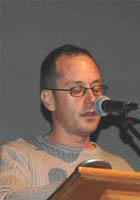COMMISSION Poem by Charl-Pierre Naudé
COMMISSION
In parables
man calls his world into being
expanding first
within himself
(foot resembles hand),
then planting the fence in poles.
The sequins he pisses
to trace his journey, or hangs from the trees
to mark his ambit,
eventually reflect each other
like a school of fish reflects fish
should it walk the earth:
hard to say where the origin lies.
Here comes the wheel,
freely wheeling
seasons that never cease to roll,
quartered like neighbours
in need of each other, thus of the soul,
and by default, a symbol.
And gods drawn from the mountain stream
poured
into perfectly mismatched, clanging pails,
does this not provide an explanation
for uncomfortable things?
Henceforth a quatrain
as prescribed from Above
will plough with syll-a-bles
and be four-sided like a village plain.
And the double-jointed couplet?
Still a goat with horns intact
who yet will step within the lines
and diligently abide the civil pact.
The rhythms
of unearthed Greek and Roman theatres
failed to rhyme
with "windmills", "union" and "hood"
were, however, understood:
Just add water
instantly
and put the batch in the sun, dammit.
The cadence and purpose of verse
(floating rigs with rudders, pennants slip-streaming the wake)
veered off course to Africa.
(Shame, a shipment called the villanelle -
five oars portside from the Pentateuch
and four starboard named the gospels
- God! Forever keeping the toll -
the way humanity limped
on the water, one would swear
this was faith.)
The epic, a wagon with oxen
that in olden days brought home the ham
was a stutterbox on the new continent
run aground on ridges
and had to be rejigged.
Wilderness, bush, the immeasurable. Randomly slashed. Hang on.
Seems to me here is a bit of crafted ground, yes -
yes: a path
and poles topped with masks
planted alongside. What does it mean? Thank God,
a small clearing and,
God's truth (rumours were heard),
the ominous stench: a poisonous, flesh-eating,
lovely
home bloom,
and what protrudes - above the petalled crown -
in native truth
was my own head
This poem has not been translated into any other language yet.
I would like to translate this poem